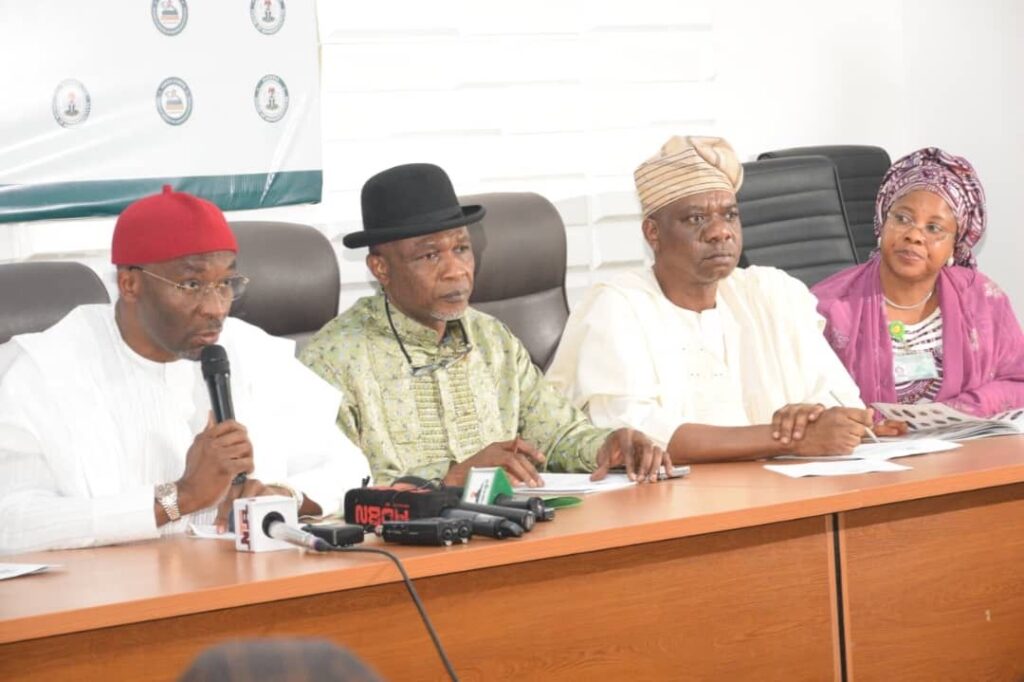The House of Representatives Committee on the Review of the 1999 Constitution is to engage Nigerians on the requests for the creation of 46 new states, 117 Local Government Areas and 86 bills at public hearings to be held in 12 centres across the six geopolitical zones.
Chairman of the committee and deputy speaker of the House, Benjamin Kalu disclosed this on Wednesday while unveiling a summarised compendium of 86 Constitution Review Bills currently at the National Assembly.
He said the zonal public hearings will hold in six centres of the three geopolitical zones in the North from Friday, 11th July to Sunday, 13th July 2025, and in six centres of the three Geopolitical Zones in the South from Friday, 18th to Sunday, 20th July, 2025 while the national public hearing will hold on Monday, July 21, 2025.
The proposed 46 states include six from the North East: Savannah state out of Borno; Kwararafa state, South Sardauna state and Muri state out of Taraba state, Katagum state out of Bauchi and Amana state out of Adamawa state.
In the North West, there are seven proposed states: Gurara and New Kaduna state out of Kaduna state, Hadejis state out of Jigsaw, Gobir state out of Sokoto state, Kainji state out of Kebbi and Niger state, Tiga and Ghari states out of Kano state.
The North Central has the highest number of proposed states, twelve including: Apa, Apa-Agba and Ayatutu (Benue Ala) states out of Benue state, Okun and Okura states out of Kogi state, New Kogi state out of Kogi, Nasarawa and Edo states; Abuja state out of FCT, Ifesowapo state out of Kwara state, Plateau, South Plateau and Lowland states out of Plateau states.
For the South East, there are six proposed states including: Orashi state out Anambra, Imo and Rivers state, Anioma, Etiti, Aba and Orlu states out of South East geopolitical zones and Adada state out of Enugu state.
The South South has seven proposed states made up of Atlantic City, Bori and Europa states out of Rivers state, Obolo out of Akwa Ibom and Rivers states, Warri state out of Delta state, Toru-Ebe state out of Delta, Edo and Ondo, and Onoja state out of Cross River state.
In the South West, there are Ijebu and Remo states out of Ogun state, Igbomina state out of Osun, Kwara and Ekiti states, Oke-Ogun, Ibadan and New Oyo states out of Oyo state, Lagoon state out of Lagos and Ogun states and Ife-Ijesha state out of Osun, Ondo and Ekiti states.
For the new local governments, 24 have been proposed for South East and South South respectively, 22 for North East, 22 for North Central, 14 for North West and 12 for South West.
While unveiling the compendium, the deputy speaker said 86 constitution review bills currently under consideration in the House will be presented to the general public in form of a compressed compendium consisting of a collation of explanatory memoranda, long titles and a comprehensive exposé of the bills for their inputs.
The compendium is organised into 13 thematic areas, including electoral reforms, judicial reforms, legislature, inclusive governance, security and policing, devolution of powers and strengthening of institutions.
Others are traditional institutions, fiscal reforms, citizenship and indigeneship, fundamental human rights, local government reform and creation of states and local governments.
He also said that the zonal public hearings are aimed at fostering public engagement and soliciting inputs from Nigerians on the proposed legislative reforms, revealing that the House intends to use the feedback gathered from the public to inform its decisions when the bills are brought up for voting.
He said stakeholders and members of the public will have the opportunity to scrutinize the bills, seek clarifications, and provide constructive inputs.
“These hearings are designed to provide an open platform for citizens, civil
society organisations, professional bodies, traditional institutions, and
other interest groups to express their views and contribute meaningfully to
the constitutional reform process”.
Kalu encouraged members of the public to download the compendium, review the proposed bills, and provide feedback to inform the legislative process.
“In conclusion, I call on all stakeholders and the general public to actively
participate in the zonal and national public hearings. Your contributions and
inputs are crucial to the success of this constitutional review process.”















